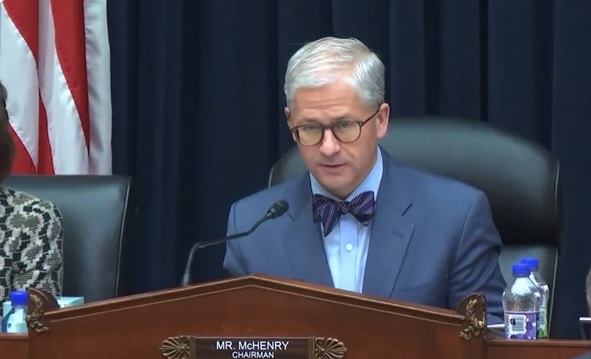Republican Lawmakers Attack SEC Climate Disclosure Rule “in Any Form”

A group of U.S. Republican congressional leaders announced today the publication of a letter to Securities and Exchange Commission (SEC) Chair Gary Gensler regarding the commission’s proposed climate-related disclosure rule, arguing that the rule exceeds the SEC’s authority, and accusing the SEC under Gensler of pursuing a “progressive socialSocial criteria examine how it manages relationships with employees, suppliers, customers, and the communities where it operates. More agenda.”
Signatories to the letter included Chairman of the House Financial Services Committee, Patrick McHenry, Ranking Member of the Senate Committee on Banking, Housing, and Urban Affairs, Tim Scott, and Chairman of the Subcommittee on Oversight and Investigations, Bill Huizenga.
The SEC released its proposed climate disclosure rules in March 2022, which would require U.S. companies to provide information on climate risks facing their businesses, and plans to address those risks, along with metrics detailing the companies’ operational climate footprint, and in some cases emissions emanating across their value chains. The updated rules are expected to be released in April.
The letter follows the formation earlier this month by Republicans in Congress of an “ESGEnvironmental, social, and governance (ESG) criteria are a set of standards for a company’s operations that socially conscious investors use to screen potential investments. More Working Group,” led by Huizenga, aimed at coordinating the party’s approach to ESGEnvironmental, social, and governance (ESG) criteria are a set of standards for a company’s operations that socially conscious investors use to screen potential investments. More proposals, and setting a key focus area to “rein in the SEC’s regulatory overreach.”
When forming the group, Huizenga specifically referred to the SEC’s climate disclosure rule as a “prime example of overreach,” and cited the Supreme Court’s decision last year ruling that the EnvironmentalEnvironmental criteria consider how a company performs as a steward of nature. More Protection Agency (EPA) did not have the authority to regulate limits to carbon emissions from coal plants. This ruling was referenced again in today’s letter, which said:
“We remind you of the limitations on your statutory authority, particularly following the Supreme Court’s recent ruling in West Virginia v. EPA. In that case, the Court held that under the major questions doctrine, a government agency must point to clear congressional authorization for its actions; it cannot simply create new interpretations of existing law to justify far-reaching policy changes that Congress never intended. Congress did not intend for the SEC to be an arbiter of business strategies, much less the determining body for climate policies.”
In a recent media interview, Gensler said that the SEC was considering some adjustments to the proposed climate disclosure rules prior to their anticipated release in April, noting that the proposals have generated a significant amount of feedback, with over 15,000 comments received.
Two of the primary issues from the proposals that appear to have drawn significant attention in the feedback received by the SEC include a rule requiring climate costs to be reported if they represent more than 1% of a financial statement line item, and the requirement in some cases to report on emissions in company value chains beyond the company’s direct control, or Scope 3 emissions. Criticisms about these requirements include the high cost of providing these disclosures, suggestions of immateriality in some cases, and concerns about the ability to provide accurate information.
In the Republican letter, however, the lawmakers indicated that easing the reporting burden wouldn’t be sufficient, arguing that a climate disclosure rule “in any form,” would “harm consumers, workers, and the U.S. economy.”
The letter asks Gensler to provide information “to allow the Congressional committees with jurisdiction over the SEC to fully examine the SEC’s proposed rule and the SEC’s actions related to it,” including answers to questions regarding the commission’s consideration of the impact of the proposed rules on energy prices, whether the SEC has made efforts to minimize First Amendment free speech concerns arising from the rule, and the commission’s coordination with Federal Agencies, NGOs, and the White House on the rules, among others, asking for a response by March 8.
Click here to access the letter.
The post Republican Lawmakers Attack SEC Climate Disclosure Rule “in Any Form” appeared first on ESG Today.